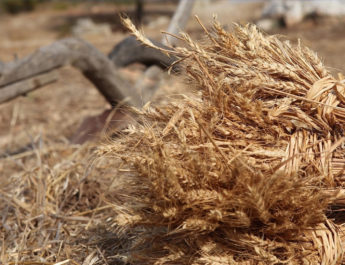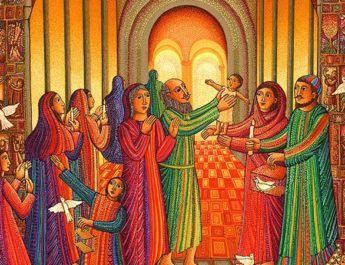Psalm 68:1-10, 32-35
Seventh Sunday of Easter A
To the leader.I Of David.II A Psalm.III A Song.IV
I “leader” = natsach. Properly, something that glitters from a distance. So, something that stands out, excels, has status/standing (such as a chief musician or superintendent of Temple services). This can also mean to be permanent or enduring.
II “David” = David. From the same as dod (beloved, love, uncle); the root may mean to boil, which is used figuratively to describe love. So, this implies someone you love such as a friend, a lover, or a close family member like an uncle. David’s name likely means something like “beloved one.”
III “Psalm” = mizmor. From zamar (making music; used specially of music to worship God; music with singing, singing praise, singing psalms); may be from zamar (to trim or prune). This is a melody or a psalm.
IV “Song” = shir. From shir (to sing; one who is singing or leading others in song). This is song or singer.
1 Let GodV rise up;VI let his enemiesVII be scattered;VIII
let those who hateIX him fleeX beforeXI him.
V “God” = Elohim.
VI “rise up” = qum. To arise, stand, accomplish, establish, abide. This is rising as in rising against, getting up after being sick or asleep, arising from one state to another, becoming powerful, or rising for action. It can also be standing in a figurative sense.
VII “enemies” = oyeb. From ayab (to hate or be hostile to). This is a foe or enemy as one that you are hostile to.
VIII “scattered” = puts. This is to dash in pieces, scatter, disperse, drive.
IX “hate” = sane. This is to hate, an enemy. It is a personal hatred and not an abstract one.
X “flee” = nus. This is to flee, vanish away, hide, escape, be displayed.
XI “before” = paneh. From panah (to turn, face, appear). This is face in a literal or figurative sense. It could be face, presence, anger, respect. It can also be used of God to indicate divine favor or presence.
2 As smokeXII is driven away,XIII so drive them away;
as waxXIV meltsXV beforeXVI the fire,XVII
XII “smoke” = ashan. From ashan (to smoke or burn in a literal or figurative sense; to be angry). This is smoke, vapor, dust, or anger.
XIII “driven away” = nadaph. 9x in OT. This is to drive away, flee, rout, toss about, disperse.
XIV “wax” = donag. 4x in OT – 3x in Psalms, 1x in Micah. This is wax – always used of wax meting.
XV “melts” = masas. This is to melt, discourage, faint. It can be to deteriorate from a sickness or weaken because of sleepiness or an emotional response.
XVI “before” = paneh. Same as “before” in v1. See note XI above.
XVII “fire” = esh. This is fire, burning, flaming, hot. It is fire in a literal or figurative sense.
let the wickedXVIII perishXIX beforeXX God.
XVIII “wicked” = rasha. This is morally wrong so it refers to someone who is actively bad as wicked, criminal, an evil person, offender, condemned, or ungodly.
XIX “perish” = abad. To wander off, lose self. This implies to perish, destroy, die, vanish, or be broken or corrupt.
XX “before” = paneh. Same as “before” in v1. See note XI above.
3 But let the righteousXXI be joyful;XXII
let them exultXXIII beforeXXIV God;
let them be jubilantXXV with joy.XXVI
XXI “righteous” = tsaddiq. From the same as tsedeq (rightness, righteousness, just cause, vindication; that which is right in a natural, moral, or legal sense; abstractly equity; figuratively prosperity). This is just, innocent, righteous, righteous one, or lawful.
XXII “be joyful” = samach. This is to rejoice or be glad. Properly, it is to brighten up in a literal or figurative sense.
XXIII “exult” = alats. 8x in OT. This is to jump for joy, rejoice, triumph, or exult.
XXIV “before” = paneh. Same as “before” in v1. See note XI above.
XXV “be jubilant” = sus. This is to rejoice or be glad. Properly, it is to be bright or cheerful.
XXVI “joy” = simchah. Related to “be joyful” in v3. From samach (see note XXII above). This is joy, rejoicing, pleasure, or glee.
4 SingXXVII to God; sing praisesXXVIII to his name;XXIX
XXVII “sing” = shir. Related to “Song” in superscription. See note IV above.
XXVIII “sing praises” = zamar. Related to “Psalm” in superscription. See note III above.
XXIX “name” = shem. May be from sum (to put, place, set). This is name, fame, renown. A name was thought to indicate something essential about a person – something about their individuality. So, this word can also mean honor, authority, or character.
lift up a songXXX to him who ridesXXXI upon the cloudsXXXII—
XXX “lift up a song” = salal. 12x in OT. This is to lift up, pile, build, make plain, extol, exalt.
XXXI “rides” = rakab. This is to ride an animal or in some vehicle. It can also mean bringing on a horse.
XXXII “clouds” = arabah. From the same as arab (desert plateau, Arabia) OR from arab (to become evening); {from ereb (evening) or from arab (to exchange, give or take on pledge, braid, intermix)}. This is a desert valley or plain, wilderness. Also, the name of a place Arabah.
his name is the LordXXXIII—
be exultantXXXIV beforeXXXV him.
XXXIII “Lord” = Yah. From YHVH (proper name of the God of Israel; God, Lord; the self-existent or eternal one); from havah (to become) or hayah (to be, become, happen)}. This is Lord or God – a shortened form of God’s most holy name.
XXXIV “be exultant” = alaz. 16x in OT. This is to jump for joy, rejoice, triumph, or be jubilant.
XXXV “before” = paneh. Same as “before” in v1. See note XI above.
5 FatherXXXVI of orphansXXXVII and protectorXXXVIII of widowsXXXIX
is God in his holyXL habitation.XLI
XXXVI “Father” = ab. This is father, chief, or ancestor. It is father in a literal or figurative sense.
XXXVII “orphans” = yathom. This is a child without a father or more generally a person who is bereaved.
XXXVIII “protector” = dayyan. 2x in OT. From din (to judge, defend, dispute, govern, quarrel, plead). This is a judge or advocate.
XXXIX “widows” = almanah. Related to alman (widowed); from alam (to be silent, bound). This is a widow or a house that is desolate.
XL “holy” = qodesh. This is set apart and so sacred. God is different from us and so God is holy/set apart. Things we dedicate to God’s service are set apart for God and so they, too, are holy, etc.
XLI “habitation” = maon. 17x in OT. From anah (to answer, respond, announce, sing, shout, or testify; to pay attention, which implies responding and, by extension, starting to talk; singing, shouting, testifying, etc.) OR from the same as onah (marriage, living together, marital duty). This is dwelling, den, haunt, retreat. It can refer to the Tabernacle or Temple. It can also be used for homes or animal lairs.
6 God gives the desolateXLII a homeXLIII to live in;XLIV
XLII “desolate” = yachid. 12x in OT. From yachad (to join, be united). This is united, sole, solitary, only, or desolate. It can also mean beloved or darling.
XLIII “home” = bayit. Probably from banah (to build, make, set up, obtain children; to build literally or figuratively). This is house, court, family, palace, temple.
XLIV “gives…to live in” = yashab. This is to sit and so to remain and so to dwell. It is sitting for any reason – as a judge, in order to ambush, or just sitting quietly. Causatively, this can mean settling or marrying. This can also mean continue, endure, or establish.
he leads outXLV the prisonersXLVI to prosperity,XLVII
XLV “leads out” = yatsa. This is to go or come out, bring forth, appear. It is to go out in a literal or figurative sense.
XLVI “prisoners” = asir. 12x in OT. From asar (to tie, yoke, bind, or fasten; can mean to harness an animal, to join in fighting a battle, or to imprison someone). This is a prisoner or captive. It can also refer to a slave or someone otherwise bound.
XLVII “prosperity” = kosharah. 1x in OT. From kasher (to succeed, be proper, be right, be acceptable). This is prosperity or freedom.
butXLVIII the rebelliousXLIX liveL in a parchedLI land.
XLVIII “but” = ak. Related to aken (surely, truly, nevertheless); from kun (properly, in a perpendicular position; literally, to establish, fix, fasten, prepare; figuratively, it is certainty, to be firm, faithfulness, render sure or prosperous). This is a positive statement – surely, also, certainly, alone, only.
XLIX “rebellious” = sarar. 17x in OT. This is turning away, backsliding, rebellious.
L “live” = shakan. This is to settle down in the sense of residing somewhere or staying there permanently. It can mean abide or continue. “Mishkan,” taken from this verb, is the Hebrew word for the Tabernacle (as a place where God abided).
LI “parched” = tsechichah. 1x in OT. From tsachiach (shining surface, exposed, top, glaring; a bright surface because the sun shines on it); from tsachach (to be whiter, glare, be dazzling). This is a parched or dry land, the desert.
7 O God, when you went outLII beforeLIII your people,LIV
LII “went out” = yatsa. Same as “leads out” in v6. See note XLV above.
LIII “before” = paneh. Same as “before” in v1. See note XI above.
LIV “people” = am. From amam (to darken, hide, associate; creating shadows by huddling together). This is people or nation. It can be used specifically for a tribe, collectively of troops or armies, or figuratively to refer to a flock of animals.
when you marchedLV through the wilderness,LVI SelahLVII
LV “marched” = tsaad. 8x in OT. This is to step, go, run, walk, to pace. It is to march with a regular step, climb up, hurl down.
LVI “wilderness” = yeshimon. 13x in OT. From yasham (to be stripped, destroyed, desolate). This is a wilderness or desert. It can also refer to a place called Jeshimon. It means “wasteland” or “wilderness.” See https://www.abarim-publications.com/Meaning/Jeshimon.html
LVII “selah” = selah. Related to “lift up a song” in v4. From salal (see note XXX above). This is to lift up or exalt. Also, “selah” in the psalms where its precise meaning is uncertain. It could be a pause in the music, a moment of silence. It could signal a change in the service or mean something akin to amen.
8 the earthLVIII quaked,LIX, LX the heavensLXI poured downLXII rain
LVIII “earth” = erets. Root may mean to be firm. This is earth, ground, field land, or country.
LIX “quaked” = raash. This is to quake, shake, tremble, shake from fear; leap like a locust.
LX {untranslated} = aph. This is also, furthermore, even.
LXI “heavens” = shamayim. Root may mean being lofty. This is sky, the air, or heaven. It is in a dual noun form so this might refer to the part of the sky where the clouds move on the one hand and the part beyond that where the sun, moon, and stars are on the other hand.
LXII “poured down” = nataph. 18x in OT. This is to drip, ooze, or drop. It can also refer to the process of gradual distillation that causes liquid to fall drop by drop. Figuratively, it can mean prophesying or inspired speech.
at the presenceLXIII of God, the God of Sinai,LXIV
at the presenceLXV of God, the God of Israel.LXVI
LXIII “presence” = paneh. Same as “before” in v1. See note XI above.
LXIV “Sinai” = Sinay. Probably from the same as Sin (Sin, a city meaning “clay” or “bush); {perhaps from asam (to gather, store) OR from seneh (thorn bush) OR related to Aramaic siyn (a god called Sin) OR perhaps Hebrew siyn (related to mud or clay)}. This is Sinai – a place whose name may mean “bush of the Lord” or “muddy.” See https://www.abarim-publications.com/Meaning/Sinai.html
LXV “presence” = paneh. Same as “before” in v1. See note XI above.
LXVI “Israel” = Yisrael. Related to “God” in v1. From sarah (to persist, exert oneself, contend, persevere, wrestle, prevail) + el (see note V above). This is Israel, meaning God strives or one who strives with God; new name for Jacob and for his offspring. This refers to the people and to the land.
9 RainLXVII in abundance,LXVIII O God, you showered abroad;LXIX
LXVII “rain” = geshem. Perhaps from gasham (to rain). This is rain, shower, or rainy. It can be used figuratively for blessing or for destruction.
LXVIII “abundance” = nedabah. From nadab (to offer willingly, volunteer, freely give, be willing). This is a freewill offering, something giving spontaneously.
LXIX “showered abroad” = nuph. This is to rock back and forth, wave, sprinkle, quiver, beckon, offer, present.
you restoredLXX your heritageLXXI when it languished;LXXII
LXX “restored” = kun. Related to “but” in v6. See note XLVIII above.
LXXI “heritage” = nachalah. Related to nachal (to inherit, occupy, distribute, take as heritage). This is properly something that was inherited. It can mean occupancy generally or, more particularly, an heirloom or an estate. This can be an inheritance, gift, possession, or portion.
LXXII “languished” = laah. 19x in OT. This is to be weary or exhausted, parched, faint, or tired. It could also mean to be impatient, or have a hard time. Figuratively, this could refer to being grieved or disgusted. This is the root verb that Leah comes from.
10 your flockLXXIII found a dwellingLXXIV in it;
in your goodness,LXXV O God, you providedLXXVI for the needy.LXXVII
LXXIII “flock” = chay. From chayah (to live or keep alive literally or figuratively). This is alive, living, lifetime. It can also be used to describe someone’s age. It can refer to animals, plants, water, or a company or congregation of people. It is life in a very broad sense.
LXXIV “found a dwelling” = yashab. Same as “gives…to live in” in v6. See note XLIV above.
LXXV “goodness” = tob. From tob (to be pleasing, to be good). This is good, beautiful, pleasant, agreeable, bountiful, at ease. This word is used for goodness as a concept, a good thing, a good person. This can refer to prosperity and welfare as well as joy, kindness, sweetness, and graciousness. So, this is ethically good, but also enjoyably good.
LXXVI “provided” = kun. Same as “restored” in v9. See note LXX above.
LXXVII “needy” = ani. From anah (to be bowed down; humility or being browbeaten, oppressed, afflicted, or depressed; literal or figurative – depressed in mood or circumstance). This is humble, lowly, poor, or afflicted.
32 Sing to God, O kingdomsLXXVIII of the earth;
sing praises to the Lord,LXXIX Selah
33 O riderLXXX in the heavens, the ancientLXXXI heavens;
LXXVIII “kingdoms” = mamlakah. From the same as melek (king, royal). This is kingdom, dominion, sovereignty, rule. It can also refer to the realm.
LXXIX “Lord” = Adonai. From adon (lord, master, owner); root means to rule or be sovereign. This is the actual Hebrew word for Lord used (in a different form) of humans and (in the present form) of God. It means someone who is in control.
LXXX “rider” = rakab. Same as “rides” in v4. See note XXXI above.
LXXXI “ancient” = qedem. Perhaps from qadam (to come in front or be in front; to meet, anticipate, confront, receive, or rise; sometimes to meet for help). This is front, formerly, before, east, eternal, everlasting, antiquity.
listen,LXXXII he sends outLXXXIII his voice,LXXXIV his mightyLXXXV voice.
LXXXII “listen” = hen. This is a remark of surprise or excitement: lo! Behold! It can also mean if or though.
LXXXIII “sends out” = natan. This is to give, put, set, offer. It is to give literally or figuratively.
LXXXIV “voice” = qol. This is a sound, used often for human voices. Also used when God speaks or angels, animals or instruments. It can be a cry or a noise, thunder or earthquakes and so on.
LXXXV “mighty” = oz. From azaz (to be strong, become fixed, be bold, prevail, be impudent; it means to be stout literally or figuratively. A Late Hebrew word). This is strength in the sense of force, majesty, praise, material and physical strength, the abstract notion of security. It can also speak of social or political power.
34 AscribeLXXXVI powerLXXXVII to God,
whose majestyLXXXVIII is over Israel
and whose power is in the skies.LXXXIX
LXXXVI “ascribe” = natan. Same as “sends out” in v33. See note LXXXIII above.
LXXXVII “power” = oz. Same as “mighty” in v33. See note LXXXV above.
LXXXVIII “majesty” = gaavah. 19x in OT. From gaah (to rise up, be exalted, triumph; figuratively, be majestic). This is majesty, excellency, pride, or arrogance. It can also mean ornament.
LXXXIX “skies” = shachaq. From shachaq (to rub off, wear away, pulverize). This is powder, dust, vapor. It can also refer to the sky or a cloud.
35 Awesome isXC God in his sanctuary,XCI
the GodXCII of Israel;
XC “awesome is” = yare. This is to fear, be afraid, dreadful. It can also refer to fearful reverence – to fear in a moral sense is to say to revere, respect.
XCI “sanctuary” = miqdash. Related to “holy” in v5. From the same as qodesh (see note XL above). This is a sacred place, sanctuary, holy place. It is something or somewhere that is consecrated, whether to God or to another.
XCII “God” = El. Related to “God” in v1 & “Israel” in v8. See note V above.
he givesXCIII power and strengthXCIV to his people.
Blessed beXCV God!XCVI
XCIII “gives” = natan. Same as “sends out” in v33. See note LXXXIII above.
XCIV “strength” = taatsumah. 1x in OT. From atsam (vast, numerous, strong; to close one’s eyes, to make powerful; to break bones). This is might or power.
XCV “blessed be” = barak. This is to kneel, to bless. It is blessing God as part of worship and adoration or blessing humans to help them. It can be used as a euphemism to say curse God.
XCVI “God” = Elohim. Same as “God” in v1. See note V above.
Image credit: “Pouring Rain” by Jimmy Baikovicius, 2012.




